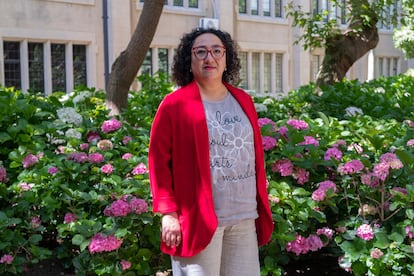Pamela Soto, philosopher: ‘Our democracy serves to elect representatives, but it does not allow us to have a better life’
The Chilean researcher emphasizes that we must think about a political system from the perspective of those who live on its margins


The Chilean philosopher Pamela Soto sits down for an interview with EL PAÍS at the top of a hill, with the port city of Valparaíso at her feet and the Pacific Ocean on the horizon. Before delving into her areas of research — democracy, education and feminism — the 48-year-old proudly points out the sights of her hometown.
She recently began teaching at the Federico Santa María Technical University. A member of the Network of Feminist Philosophers, her work grapples with the exhaustion felt by those who live in representative democracies. She’s also an expert in the philosophical thought of Spanish essayist María Zambrano (1904-1991). In 2023, she published a biography on Zambrano, reviewing the scars of her 50-year-long exile and proposing alternatives to the democratic system in its current form.
Question. Why did you become interested in studying democracy?
Answer. Until I was a teenager, I grew up under the Pinochet dictatorship in Valparaíso, a city that has always sought greater independence in relation to Santiago. There were many political labels that I heard as a child, which I didn’t understand well. Over the years, they consolidated into a notion of how to think about democracy, which I had always categorized as something very positive. But when I started teaching classes on democracy, I met 18-year-olds who — after a life of marginalization in their families, at school and in their neighborhoods — told me that democracy was unjust.
Q. How did that statement impact your work?
A. For me, it’s been the strongest theoretical shock I’ve ever had. Until 2011, I had thought about the category of democracy from the perspective of philosophy, not from life experience. With this diagnosis [made by teenagers], one wonders what we’ve done with democracy... in the end, it becomes an empty signifier. It serves to elect representatives, yes, but it’s not allowing us to have a better life. What happens when your experience isn’t positive? From this point, I began to think about other dimensions of democracy and not exclusively about a government model.
Q. What conclusion have you reached?
A. For me, it makes no sense to try to reach Greek democracy as an ideal. Our present demands a much more participatory and everyday democracy. The erosion of this democracy for citizens is evident, marked by despotic and authoritarian actions. In this space, democracy is diluted, and that worries me.
Q. What space are you referring to?
A. I think about — for example — a school, where very hierarchical relationships are maintained. Student opinion is always marginalized. At work, it seems that hierarchy between groups predominates. This will always have elements of despotism, since only one group makes the decisions.
It’s necessary to incorporate new readings of democracy, otherwise it will be devalued. My concern — linked to the boredom and exhaustion of representative democracy — has to do with the fact that any political decision comes very slowly to our lives. Therefore, it seems that politics is very much beyond our daily lives.
Q. How do you think we can organize ourselves better?
A. The category of “nation state” homogenizes and dilutes the difference too much. Therefore, we’re not represented, or we don’t feel linked to the national project. This is the metropolitan logic, which erases all the difference between places. When one talks about a territory, one isn’t referring to the soil, but to the relationship dynamics that occur in that specific place, which are super different. That’s why I believe that democracies don’t work, because they begin to be homogenized. We have too many differences. And, if these differences aren’t seen, we get lost.
Q. What alternative do you propose?
A. Communal democracies, where citizen spaces can have more impact, so that people can quickly see improvements. I’m not saying that it’s the solution to all our problems, but we need forms of government that allow public policy to reach the citizenry more directly, so that politics isn’t seen as irrelevant in our lives. Today, it seems that politics works in a way that’s completely unrelated to what happens to us. It prevents us from being a collective. This generates fear, emptiness and a limbo where there’s no protection.
Q. Is politics using the tool of fear more often?
A. Politics always uses it and changes up who the enemy is: migrants, crime, or even the climate. There’s a deep-rooted use of population control at different levels related to how politicians keep the public worried about things that have nothing to do with how to organize collectively. Fear works very well to keep people separated. Fear is sold to us as a means of control. Now, faced with this control, we can either act individually or collectively, and my bet is on the second option.
Q. What are your thoughts on exile?
A. The category of exile shows us that it’s possible to live without a sovereign. Political punishment precisely consists of removing you from your familiar context, from this history, where you were, where you set up your network. When Franco died, [the Spanish essayist] María Zambrano said that she wasn’t happy, because no one was going to give her back the life that she hadn’t been able to live [in exile], nor her friends who had died [while she was away].
To recover from exile, you have to reflect from all angles and recover the memories that were distanced. Today, I’m worried that politics and thinking differently will be punished.
Q. Is Chile, more than 50 years after the coup d’état, working on recovering its memory?
A. No. We still have a lot to do. We must continue to delve deeper. As the Network of Feminist Philosophers, we’re researching exiled philosophers. It’s vital to know our recent history to feel part of a place, inhabit a city, live in a context, understand who we are. Zambrano said that time isn’t linear — it’s prospective and projective at the same time. We’re missing the vital experience of feeling that we’re all the women who have lived in this territory. That collective life is part of the past, the present and the future.
Q. You’ve noted that democracy has lost its meaning. And what has happened to feminism? What are feminists thinking?
A. Today, we see an international policy related to women’s inequalities in science, technology, engineering and mathematics. Between now and 2050, a large percentage of jobs will be linked to these areas. Therefore, if women don’t enter these careers, the level of inequality will increase. That’s absolutely worrying. One can no longer think about politics without thinking about technology, which is advancing at such a fast speed.
Sign up for our weekly newsletter to get more English-language news coverage from EL PAÍS USA Edition
Tu suscripción se está usando en otro dispositivo
¿Quieres añadir otro usuario a tu suscripción?
Si continúas leyendo en este dispositivo, no se podrá leer en el otro.
FlechaTu suscripción se está usando en otro dispositivo y solo puedes acceder a EL PAÍS desde un dispositivo a la vez.
Si quieres compartir tu cuenta, cambia tu suscripción a la modalidad Premium, así podrás añadir otro usuario. Cada uno accederá con su propia cuenta de email, lo que os permitirá personalizar vuestra experiencia en EL PAÍS.
¿Tienes una suscripción de empresa? Accede aquí para contratar más cuentas.
En el caso de no saber quién está usando tu cuenta, te recomendamos cambiar tu contraseña aquí.
Si decides continuar compartiendo tu cuenta, este mensaje se mostrará en tu dispositivo y en el de la otra persona que está usando tu cuenta de forma indefinida, afectando a tu experiencia de lectura. Puedes consultar aquí los términos y condiciones de la suscripción digital.








































